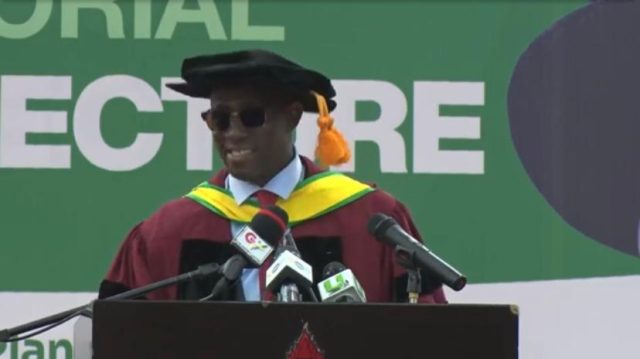Professor Michael Poku-Boansi, a professor of Planning at the Faculty of Built Environment, Kwame Nkrumah University of Science and Technology, has proposed the re-development of slums and informal settlements into sustainable communities where access to basic facilities abound.
He observed that most people living in material poverty in African cities lived in informal and slum settlements, many of which are located far away from the centralized economic and social activities of the city.
In instances where they are located more centrally, they occupy vast areas of land, most of which lack any formal pathways or transport infrastructure, and this causes a spatial dislocation between key destinations, such as employment centres, schools, and hospitals, often leading to long journey distances and travel times.
Prof. Poku-Boansi who was delivering a Professorial Inaugural Lecture at the KNUST, therefore, tasked the Ministry of Works and Housing, Ministry of Local Government, Decentralisation and Rural Development, and Land Use and Spatial Planning Authority (LUPSA) to drive this process in Ghana.
He was speaking on the topic “Transport poverty in Africa: Planning for our Mobility Futures in an Era of Sustainability.
According to him, an individual is transport poor when he/she lives more than 1.6 kilometers from their nearest bus stops or railway station and where cost of running a car would place a significant strain on household budgets.
Again, one is classified transport poor when it takes over an hour to access essential goods and services by walking, cycling or public transport.
In Ghana, transport affordability as a measure of poverty focuses on the inability of people to afford the cost of transportation. If a household spends more than 10 per cent of its income on transportation-related expenses, it is deemed “transport poor” (Lucas et al., 2016).
Prof. Poku-Boansi noted that to meet the demands of the future, there should be an integrated land use and transport planning regime.
The Ministry of Transport (MoT) and LUSPA should work to implement an integrated land use and transport planning regime that has improving accessibility levels as the overriding priority, he submitted.
The Professor said, “Addressing the prevailing accessibility challenges and averting the possibility of them worsening should begin with addressing the problem of uncontrolled urban expansion.”
In addition to the preparation of District Medium-Term and Structure Plans at the local levels in Ghana, he proposed the preparation of local transport plans.
These are strategic documents outlining policies for sustainable transport in local areas, with the aim of a sustainable and inclusive transportation system that seeks to ensure travel time savings, reductions in travel costs, accessibility improvement, and reduced negative impact of transport on the environment.
Prof. Poku-Boansi also proposed the implementation of public transport services schemes as one of the best ways to stabilize transport cost and particularly maximize the financial stress on lower income people, improve accessibility, affordability, and mobility needs of the people.
He suggested the commencement of collaborative National Transport Poverty Index (NTPI) to measure how far the various districts in Ghana are addressing transport poverty.








![Stonebwoy holds star-studded party for ‘5th Dimension’ mega album [Video]](https://ghananewss.com/storage/2023/04/stonebwoy-partyy-100x75.jpeg)









